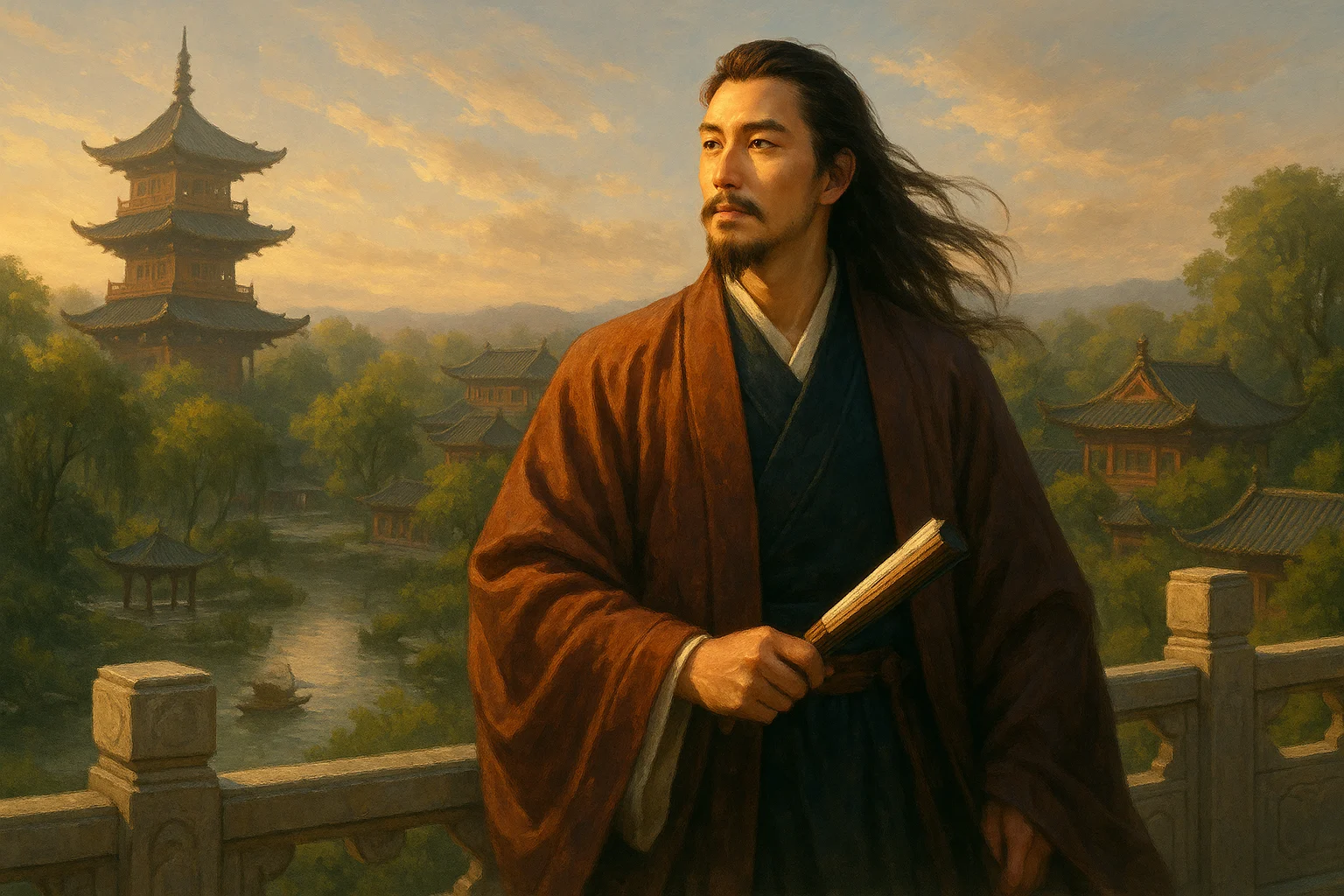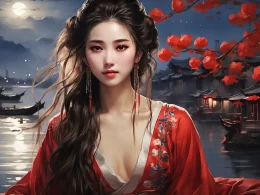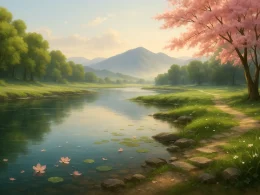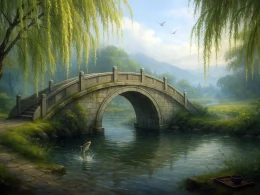A few thatched huts hover over liquid Zen,
Willows sieve sunlight through linen hem.
Last year's red blooms still cling,
Till night-winds rewrite spring.
The crescent moon computes its arc,
Drunken noon dissolves in lunar dark.
What code unlocks my heart's design?
Three orioles' quantum sign.
Original Poem
「菩萨蛮 · 数家茅屋闲临水」
数家茅屋闲临水。单衫短帽垂杨里。
花是去年红,吹开一夜风。梢梢新月偃。午醉醒来晚。
王安石
何物最关情。黄鹂三两声。
Interpretation
Composed during Wang Anshi's late years of retirement at his Banthatched Cottage in Jiangning, this lyric poem authentically portrays his withdrawal from political life to a reclusive existence. While the Nenggai Zhai Manlu records this as a cento composition, Wang skillfully tailored earlier poetic lines into seamless originality. Depicting the tranquil scenery of Ban Mountain's waterways, small bridges, thatched huts and orioles amidst sparse shadows, the work reflects his psychological transformation from statesman to hermit - no longer impassioned but rather serene and refined, revealing a deliberately transcendent yet profoundly contemplative sentiment.
First Stanza: "数家茅屋闲临水。单衫短帽垂杨里。"
Shù jiā máo wū xián lín shuǐ. Dān shān duǎn mào chuí yáng lǐ.
A few thatched huts repose by water's quiet rim; / In simple gown and short hat through willow shades I skim.
These two lines sketch the poet's retired dwelling and attire with minimalist strokes - plain, unadorned, tranquil. "Repose by water" emphasizes environmental serenity while "willow shades" captures spring's delicate charm. The "simple gown and short hat" subtly signify his departure from courtly grandeur, embracing instead the rustic pleasures of a mountain recluse.
Second Stanza: "花是去年红,吹开一夜风。"
Huā shì qùnián hóng, chuī kāi yīyè fēng.
These blooms retain last year's crimson hue, / Unfurled by a night's breeze anew.
Ostensibly depicting scenery, these lines convey deeper emotion. The enduring flowers highlight nature's cyclical return against human transience - "last year's crimson" implies "flowers return but the man has changed", lamenting the passage of time, unfulfilled aspirations and personal fate. The "night's breeze", though gentle, stirs complex sentiments, blending spring's sudden arrival with time's fleeting urgency.
Third Stanza: "梢梢新月偃。午醉醒来晚。"
Shāo shāo xīn yuè yǎn. Wǔ zuì xǐng lái wǎn.
The slender new moon dips 'midst the trees; / From noon wine I wake to evening's breeze.
"The dipping new moon" paints a still nightscape while reflecting the poet's cool, solitary mood. "Waking late from noon wine" superficially suggests leisure, yet reveals an escapist "drunken oblivion" of worldly affairs. The apparent nonchalance masks intensified loneliness upon sobriety.
Fourth Stanza: "何物最关情?黄鹂三两声。"
Hé wù zuì guān qíng? Huánglí sān liǎng shēng.
What moves my heart most? An oriole's fleeting call.
This self-questioning conclusion resonates with nuanced meaning. The oriole's song becomes an emotional catalyst - an outlet for his inner world. Though faint, "an oriole's fleeting call" pierces the solitude like an echo from the mundane world or spiritual consolation, representing both nature's voice and the lingering obsessions of his psyche.
Holistic Appreciation
This ci poem presents Wang Anshi's reclusive life with apparent tranquility, depicting scenes of leisure, drunkenness, moonlight, and orioles to compose a light and elegant mountain springscape. Yet beneath the surface, layers of the poet's reflections on life experiences, political vicissitudes, and the passage of time emerge subtly.
Though physically distant from court politics, he remains psychologically engaged with the world. The "leisure by the water" is undercut by his attentiveness to the oriole's song; the "drunken late awakening" reveals no true escape from worldly concerns. This paradoxical tone—seeming detachment masking unresolved melancholy—characterizes Wang Anshi's late poetic style, where crystalline surfaces conceal profound depths.
Artistic Merits
- Seamless Cento Composition
Though constructed from borrowed lines, the poem achieves organic unity through Wang's masterful synthesis, demonstrating his ability to "make predecessors' words serve my purpose." - Scene-Emotion Interweaving
Natural imagery—flowers, breeze, moon, orioles—becomes vessels for layered expression, indirectly conveying the poet's late-life equilibrium between contentment and quiet lament. - Clarity with Profundity
Deceptively simple language carries enduring resonance. The unadorned diction embodies Wang's signature blend of plainspokenness and philosophical weight, where purity of form contains unyielding substance.
Insights
The poem redefines reclusion: true withdrawal occurs not merely through physical departure from power, but through conscious spiritual realignment. Having weathered life's storms, Wang Anshi here demonstrates how a statesman reconciles ambition with serenity. Neither clinging to lost dreams nor abandoning principle, he transmutes unresolved tensions into poetry, using nature to reorder his inner world. This work reminds us that maturity lies in maintaining composure amidst trials while preserving intellectual vitality within apparent quietude—a lesson in balanced being.
About the Poet

Wang Anshi (王安石 1021 - 1086), a native of Linchuan in Jiangxi, was an outstanding statesman, writer, and thinker of the Northern Song Dynasty, counted among the "Eight Great Prose Masters of the Tang and Song Dynasties." His poetic achievements were particularly profound—his early works, filled with heroic language, revealed the ambition of a reformer. Though his ci poetry was few in number, it pioneered new realms of historical reflection. His poetry and prose combined intellectual depth with artistic value, and the over 1,500 works preserved in The Collected Works of Linchuan stand as a monumental testament to literary innovation in Song Dynasty literature.












